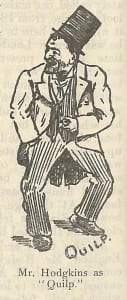“he boldly invents signs for himself” – Frank Hodgkins, Deaf Amateur Actor (1859-1914)
By H Dominic W Stiles, on 17 July 2015
Frank Hodgkins (1859-1914) was very precise when he related the age when he had lost his hearing – 15 1/2 (see census for 1911 and BDM). Frank was born in Westminster in the summer of 1859 so that would have been in the winter of 1864/5.
His father Walter, from Bristol originally, worked as a ‘gilder and carver’ and it seems his children were all employed in skilled trades of a similar type.
 In the 1881 census Frank is not described as deaf, but as we have noted before, that is not unusual and there could be a number of reasons for it.
In the 1881 census Frank is not described as deaf, but as we have noted before, that is not unusual and there could be a number of reasons for it.
 We are told in the BDM article by ‘Philo’, which is based on an interview, that Frank was artistic, with a love of poetry, music and art. He was a “delicate boy, and had much trouble with his throat when young, which interfered sadly with his schooling; but he was fond of reading, and picked up writing unassisted.” He learned his trade as an illuminator when he lost his hearing, but we are told that his heart was not in it. In the 1911 census Frank was living in 3 Stalbridge Buildings, Lumley St, Grosvenor Square, and described himself as an “illuminator on stationary”.
We are told in the BDM article by ‘Philo’, which is based on an interview, that Frank was artistic, with a love of poetry, music and art. He was a “delicate boy, and had much trouble with his throat when young, which interfered sadly with his schooling; but he was fond of reading, and picked up writing unassisted.” He learned his trade as an illuminator when he lost his hearing, but we are told that his heart was not in it. In the 1911 census Frank was living in 3 Stalbridge Buildings, Lumley St, Grosvenor Square, and described himself as an “illuminator on stationary”.
Living for much of his life in Soho (the family lived at 54 Greek street for many years), it is no surprise that he was involved with St. Anne’s Church, and later with St. Saviour’s in Oxford Street.
In the hope that the dry climate might improve his hearing, Frank went to Australia, spending time at the Institution for the Deaf and Dumb and the Blind , at Sydney, and later at the Victorian Institution. He was back in England by 1885, and a visit to the rehearsals of Abraham’s production of Hamlet at Horn’s Assembly Rooms sparked off a role stage managing. He became secretary of the Deaf and Dumb Cricket Club, and reorganised the St. Saviour’s Social Club, and gave elocution lessons to deaf people.
As a signer, Mr. Hodgkins is a brilliant innovator. Rejecting all signs that do not reach his fastidious standard, he boldly invents signs for himself, which are so clear and expressive, as well as graceful, that his congregations instantly appreciate them, though they never saw them before.
Mr. Hodgkins’s grand pleasure and hobby is acting. It is quite possible that, but for his deafness, the subject of our sketch would have been a bright ornament to the British stage.
Interviewing him on the subject, we asked him where he learned to act.
“Nowhere!” was the reply. “Acting is as natural to me as eating and breathing.”
“Then who taught you?”
“Nobody! I have taught many, however. Today there is travelling with his company an actor who first learned from my tuition in the lecture hall of St. Saviour’s, and played in some of my pieces.”
[…]
Many notices of Mr. Hodgkins’s performances have appeared in the London press, including The Stage, Era, Daily News, &c. One truly says that his impersonation of “Nan” is as clever as it is amusing; another that the conception of the parts of “Quilp” and “The Marchioness” is perfect; another that his “doubling” these parts was no easy task; another that the task was one that the finest comedian would have shrank from attempting. These are the only characters played by Mr. Hodgkins in a public hall, such as Park Hall, in Camden Town. One paper said that were he not deaf, he would make one of the finest actors living. (BDM, 1898)
Ephphathaa for April-September 1914 says Hodgkins was gravely ill at “Friedenheim, Swiss Cottage.” He was one of our helpers twenty-one years ago, and for many years – whether by entertaining us or by preaching – he was always forward in good works, and only failing health has caused his gradual retirement.” The following issue has a brief notice that he died on May 9th 1914 and was buried in Highgate cemetery.
In his memoirs Gilby mentions him, rather laconically – “Mr. Frank Hodgkins would from time to time present Rough Diamond, or Good for Nothing, or some other farce, laboriously rehearsed by him with Timothy McCarthy, George Andrews, and other less distinguished performers.”
 Philo, A deaf Actor, Mr. Frank H. Hodgkins, British Deaf Monthly,Volume 8, No. 81, 1898, p.177-9
Philo, A deaf Actor, Mr. Frank H. Hodgkins, British Deaf Monthly,Volume 8, No. 81, 1898, p.177-9
Ephphatha, [Our Notice Board, no.42,] no.21, 1914 p.3
Ephphatha, no.22, 1914, inside back cover
Ephphatha (first series) Vol. 2 p.76-7
1911 Census, Class: RG14; Piece: 419
1901 Census, Class: RG13; Piece: 101; Folio: 16; Page: 24
1881 Census, Class: RG11; Piece: 129; Folio: 15; Page: 22
Deaths Jun 1914 Hodgkins Frank 54 Hampstead 1a 673
 Close
Close

